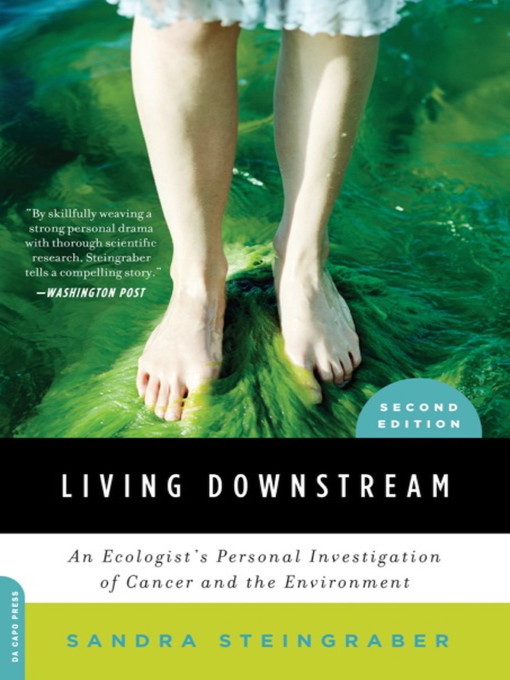- Available now
- Newly Added Ebooks
- New kids additions
- New teen additions
- Most popular
- See all ebooks collections
Living Downstream
An Ecologist's Personal Investigation of Cancer and the Environment
-
Creators
-
Publisher
-
Release date
March 23, 2010 -
Formats
-
Kindle Book
-
OverDrive Read
- ISBN: 9780306818974
-
EPUB ebook
- ISBN: 9780306818974
- File size: 726 KB
-
-
Languages
- English
-
Reviews
-
Publisher's Weekly
April 28, 1997
Thirty-five years ago, Rachel Carson's Silent Spring warned of the destructive impact of chemicals on the environment. Steingraber, a biologist, builds upon Carson's work, focusing on the link between chemicals in the environment and increasing cancer rates: "From dry-cleaning fluids to DDT, harmful substances have trespassed into the landscape and have also woven themselves, in trace amounts, into the fibers of our bodies." A cancer victim herself, Steingraber weaves a dark and pithy trail through the lives of cancer victims, their environments and increasing cancer rates. Using her home territory of Illinois as a backdrop, she successfully connects the environmental contamination of DDT, dioxin, PCB's and many other chemicals that increase the cancer rates both in nature and humans. In a chapter titled "Fire," she describes the mass building of garbage incinerators throughout the country and how they have impacted our environment by creating cancer-causing agents like dioxin and furans. Steingraber's writing is clear and concise, displaying complicated chemical and biological transformations with elegance and ease. We are living downstream, watching the increasing flow of cancer, Steingraber says, but our efforts are so consumed in curing cancer that we forget to investigate its cause. The author's well-documented account should help to rectify this disturbing and dangerous situation. -
Library Journal
July 1, 1997
In this "scientific narrative" on the environmental causes of cancer, biologist Steingraber weaves a compelling story that blends personal experience (her friend Jeannie died of a rare cancer of the spinal cord; she herself is a victim of bladder cancer), with a passion for scientific detail. She examines cancer registry data, the rise of the West's petrochemical-based economy, and the effects of substances such as DDT, dioxins, and other endocrine-disrupting chemicals on human health and ecosystems. Steingraber uses data and stories from her native state of Illinois to illustrate the overuse of incineration as a treatment technology for the "reduction" of hazardous waste and the misuse and misapplication of pesticides. She asks "why so much silence still surrounds questions about cancer's connection to the environment, and why so much scientific inquiry into this issue is still considered preliminary." This question is critical to Steingraber's argument; at least 60 different occupations have elevated death rates from cancer. While not easy reading, her work is a powerful addition to the literature on cancer's relationship to environmental exposure. Strongly recommended.--Susan Mart, Univ. of Colorado Lib., Denver
-
Formats
- Kindle Book
- OverDrive Read
- EPUB ebook
subjects
Languages
- English
Loading
Why is availability limited?
×Availability can change throughout the month based on the library's budget. You can still place a hold on the title, and your hold will be automatically filled as soon as the title is available again.
The Kindle Book format for this title is not supported on:
×Read-along ebook
×The OverDrive Read format of this ebook has professional narration that plays while you read in your browser. Learn more here.


